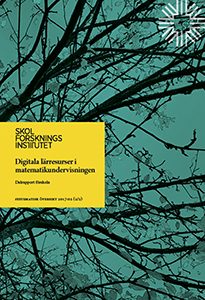Digital learning resources for preschool mathematics are used with the aim of developing children’s early understanding of mathematics. The evidence shows that well-designed digital learning resources can help children develop their maths understanding, especially in cases where the educators’ previous experiences of working with early maths in preschool are limited.

What is this review about?
This systematic review examines research on the effect of using digital learning resources on mathematics achievement in preK–12 classrooms. Here we present the results for preschool learners, including children 4–6 years old.
What studies are included?
A total of 10 studies are included in this analysis. All digital learning resources studied are designed for preschool children to support learning through playful activities and gaming. The mathematics involved is mainly about basic concepts such as space, shape, location and direction, as well as quantities, number and order. With the support of the learning resources, children get the opportunity to practice these concepts by encountering them in concrete situations and having them represented in different ways (e.g. with words, dots, lines or numbers). Some learning resources also include basic mathematical operations (e.g. 2 + 2 = 4). Most of the learning resources are intended to be used more or less independently by children individually or in small groups. There are no studies from Sweden, but all studies refer to a mathematical content relevant to the Swedish preschool context.
What are the main results in this review?
Research clearly shows that well-designed digital learning resources can help children develop their maths understanding, especially in cases where the educators’ previous experiences of working with early maths are limited. The review indicates that distinct effects may be reached within a rather limited period of time, by offering the children a few sessions per week for a number of weeks.
For children at risk of later school failure, the use of digital learning resources in preschool may prepare them for school and may be of compensatory significance. This applies mainly to children who are suspected of having low exposure to mathematics both in preschool and at home.
It should be noted that all digital learning resources studied have been carefully adapted in relation to children in preschool as regards mathematical content as well as approaches to instruction.
It is difficult to draw any distinct conclusions about certain properties that can distinguish a well-designed digital mathematics learning resource for children in preschool. However, it seems to be beneficial if the approaches encourage interaction between children and the educators; in this way, the children can be stimulated to express and use mathematical concepts. A key factor is that the maths tasks are designed to facilitate a focus on mathematics during dialogue, meaning that the children share ideas, talk about solutions and explanations, and give and ask for help in relation to the mathematical content. This can be achieved both through collaborative approaches and individual work in a shared-space setting.
What do the findings in this review mean?
This systematic review provides preschool educators with knowledge of important aspects regarding the design and use of digital learning resources for early mathematics education. The review gives guidance on what can be achieved, and how educators can plan their work in order to facilitate children’s early understanding of mathematics with the support of digital resources in preschool.
About this systematic review
We have compiled international primary research studying the use of digital learning resources on mathematics achievement in preK–12 classrooms. The research questions we answer in this review are:
- What are the effects of teaching mathematics with the support of digital learning resources on learner achievement?
- What might explain whether teaching with the support of digital learning resources has, or fails to have, an effect on learner achievement in mathematics?
Searches in both Swedish and international research databases resulted in 9,515 citations, of which 85 studies were eligible for review. 75 of these concern primary and secondary education, whereas 10 studies concern preschools. All studies were conducted as controlled experiments, meaning that the researchers have compared two or more teaching strategies with each other. Only studies estimating the effects of teaching mathematics with the support of digital learning resources on learner achievement have been included.
The systematic review is available as summary, information sheet and full report (in Swedish).
